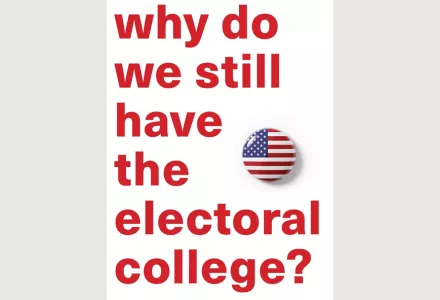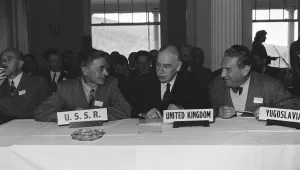In this installation of our series, Alexander Keyssar, in conversation with Graham Allison, will explore his extraordinarily relevant and timely new book, Why Do We Still Have the Electoral College? (Harvard University Press) – a must-read for every American today.
All HKS affiliates are welcome to attend; register using the RSVP link above.
Alexander Keyssar is the Matthew W. Stirling Jr. Professor of History and Social Policy at Harvard.
Harvard University Press on Why Do We Still Have the Electoral College?:
“Every four years, millions of Americans wonder why they choose their presidents through the Electoral College, an arcane institution that permits the loser of the popular vote to become president and narrows campaigns to swing states. Most Americans have long preferred a national popular vote, and Congress has attempted on many occasions to alter or scuttle the Electoral College. Several of these efforts—one as recently as 1970—came very close to winning approval. Yet this controversial system remains.
Alexander Keyssar explains its persistence. After tracing the Electoral College’s tangled origins at the Constitutional Convention, he explores the efforts from 1800 to 2020 to abolish or significantly reform it, showing why each has failed. Reasons include the complexity of the electoral system’s design, the tendency of political parties to elevate partisan advantage above democratic values, the difficulty of passing constitutional amendments, and, importantly, the South’s prolonged backing of the Electoral College, grounded in its desire to preserve white supremacy in the region. The commonly voiced explanation that small states have blocked reform for fear of losing influence proves to have been true only occasionally.
Keyssar examines why reform of the Electoral College has received so little attention from Congress for the last forty years, and considers alternatives to congressional action such as the National Popular Vote Interstate Compact and state efforts to eliminate winner-take-all. In analyzing the reasons for past failures while showing how close the nation has come to abolishing the institution, Why Do We Still Have the Electoral College? offers encouragement to those hoping to produce change in the twenty-first century."
Praise for Why Do We Still Have the Electoral College?:
“To thoroughly understand the Electoral College, but also the nature of institutional reform in general and American Constitutional reform in particular, one could hardly do better.”—Adam Gurri, Liberal Currents
“America’s greatest historian of democracy now offers an extraordinary history of the most bizarre aspect of our representative democracy—the electoral college. In a clear and complete account of this anomaly’s origins and how it has survived, we can see the outlines for how it might be replaced, or at least improved upon. This is a brilliant contribution to a critical current debate, just in time to help guide effective reform.”—Lawrence Lessig, author of They Don’t Represent Us
“Keyssar, our great narrator of the American right to vote, is a national treasure who keeps giving us the history we need right when we need it. In this thrilling achievement, he tells the history of the Electoral College—how it has repeatedly eroded democratic values and how we might come to replace it in the twenty-first century. This is a dazzling contribution not just to American history but to the American future.”—Congressman Jamie Raskin (Maryland)



